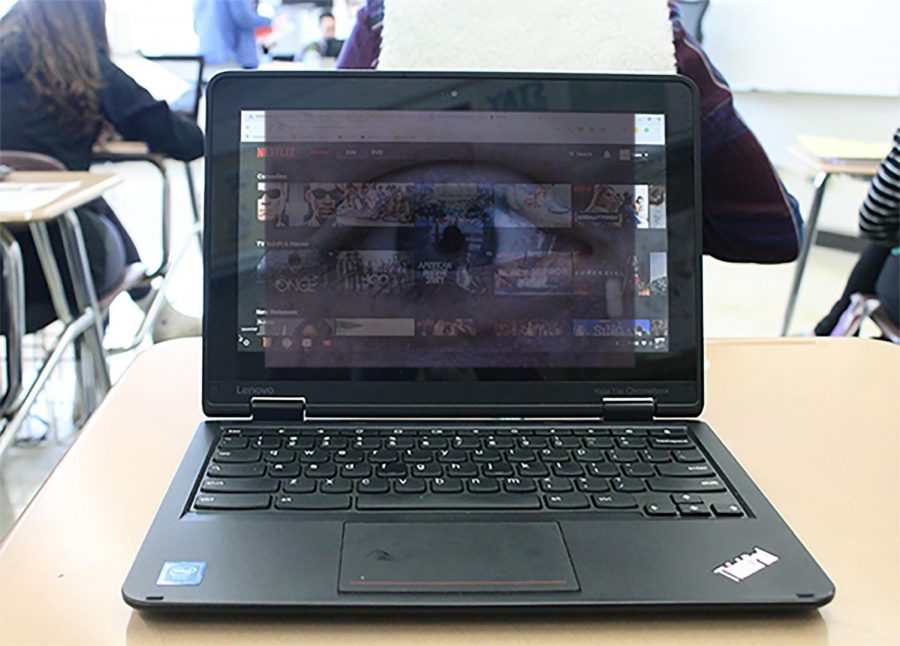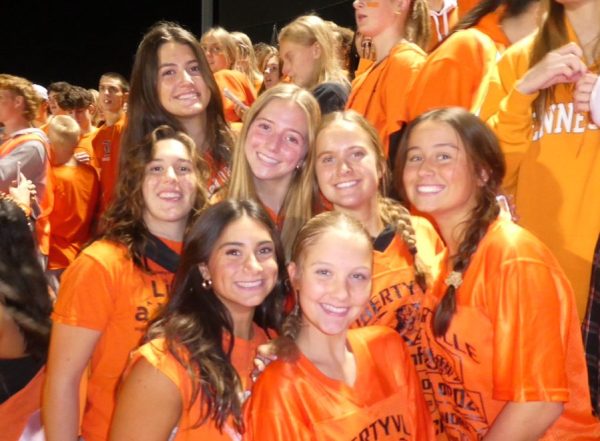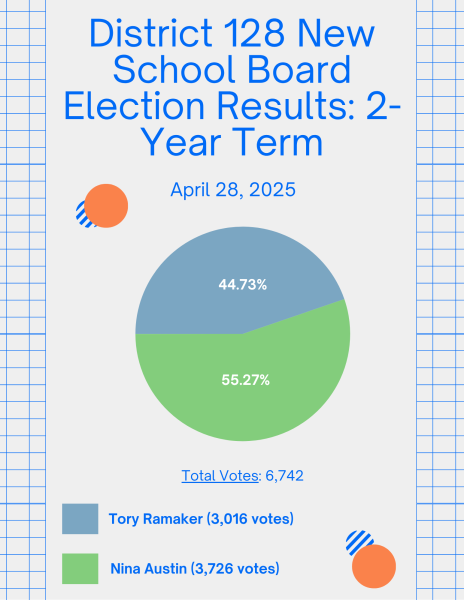Eyes Behind the Screen
Eyes reflecting into the screen of a student’s chromebook during the school day.
As new technologies are implemented at Libertyville High School, certain rules are put into place by the administration in order to check up on students and make sure they are staying on task and behaving appropriately in and outside the classroom.
Taken from the Student Handbook, the LHS Internet Safety Policy states, “It is the policy of Community High School District 128 to: (a) prevent user access over its computer network to, or transmission of, inappropriate material via Internet, electronic mail, or other forms of direct electronic communications; (b) prevent unauthorized access and other unlawful online activity; (c) prevent unauthorized online disclosure, use, or dissemination of personal identification information of minors; and (d) comply with the Children’s Internet Protection Act.”
The Children’s Internet Protection Act (CIPA) was enacted by Congress to prevent inappropriate student network usage. Inappropriate student network usage can be classified as cyberbullying, hacking or any illegal activity.
Depending on the technology being used, LHS’s administration, teachers and parents are able to monitor students in some form through Chromebooks, Hapara, PowerSchool and cell phones.
Chromebooks:
Three years ago, LHS introduced Chromebooks to the school’s Digital Learning Strategy (DLS). Since then, the administration has implemented rules and restrictions on the devices.
In order to receive federal funding, the school is required to set up website blockers and meet certain requirements because of CIPA.
“What the Children’s Internet Protection Act requires us to filter is basically pornopgraphy, obscene materials, dangerous materials, something that could potentially harm a child’s safety. Some districts maybe over-filter, they block YouTube or social media…We don’t do that…We filter the minimum amount required by CIPA,” said the district’s Educational Technology Director, Mr. Mick Torres.
Securly is a website filtering system that the school uses to either block or put restrictions on certain websites. It is also responsible for the weekly emails sent out to parents that report a student’s search history. Securly makes it so “the software cannot be modified to be dangerous,” explained Mr. Temple Murphy, LHS’s network manager.
“I think it is a good thing that the school monitors the Chromebooks because you open up this huge freedom…and students can get themselves in trouble,” expressed Mr. Dave Lapish, an English teacher. “We don’t want students to be doing things on the internet that are harmful to [themselves] or to others.”
If a student happened to violate the LHS Internet Safety Policy, they would be sent to their dean, their parents would be notified and there would be a talk between the parents, student and dean. While students are sometimes sent to their LST based upon their search history, there has never been an instance where a student Chromebook had to be taken away permanently, according to Mr. Murphy.
Hapara:
Along with administration’s ability to manage Chromebooks, teachers have ways to control the Chromebooks from inside the classroom. Using a cloud-based system called Hapara, teachers can see the most recent student activity on Chromebooks. Hapara supports collaborative assignments and highlights student browsing activity so teachers can be present with their students through this tool.
“I use Hapara whenever students are working on projects in class,” said Mrs. Tiffany Owens, a science teacher. “For the most part, students are on task, doing their work, so I think that using Hapara periodically to check in to make sure everyone is doing what they are supposed to be doing is important.”
In addition to teachers being able to see what students are doing while on their Chromebooks, Hapara can also automatically create folders in the student’s Google Drive for the teachers to easily gather and organize projects that students have been working on.
“I wouldn’t say it is an invasion of privacy,” expressed sophomore Katlyn McQuillen. “I’d say if you have a certain amount of time to work on something on Google Classroom, then I think it is okay if your teacher wants to make sure everyone is actually working on it instead of messing around.”
Other students feel uncomfortable knowing that teachers are watching what they are doing. “It kinda felt awkward when they would close out of all your other tabs…sometimes it would get annoying, but I see why they need to monitor what your doing,” said junior McKenna Rudolphi.
Parent weekly emails:
As of this year, the school has been sending out weekly emails to parents that show what sites their child has visited in the past week. Parents were able to sign up for this feature during registration for the school year.
“We have 1,800 parents currently enrolled,” expressed Mr. Murphy. The school has received little but positive feedback about this, he said.
According to Mr. Murphy, in previous school years, there had been numerous requests from parents to see what their child had been viewing. The school decided that it would be more beneficial and time-saving to have weekly emails instead of having to process each individual parent request to see the sites their children are accessing.
“With 1,800 parents requesting that type of information, it’s likely we’ll need to continue that [service], with that kind of data,” explained Mr. Murphy.
The updates come from Securly. LHS has a one-year agreement with the company, and the agreement will be reevaluated at the end of the school year.
When parents receive an email from Securly, they are given a snapshot of what their student has been looking at. It shows searched words, watched videos, and websites — both educational and non-educational — that were viewed. If the parent wants a more detailed report, they can go to their parent portal to see what sites were used on what day and time. There is also a separate category for any sites that Securly may have flagged.
While Rudolphi’s parents do not receive emails, she believes, “[the use of these emails] depends on the relationship between the parent and the child. If there a lot of trust between them, then I think it’s a bit excessive but if, as a parent, you think that your child need to be closely monitored, then I think that would be okay.”
Access to Phones:
During the day, many students connect to the guest Wi-Fi provided at school. When connected to the school’s Wi-Fi, the school monitors and tracks everything done on a cellular device. Any sites or apps that are trying to be accessed from the phone go through a filter put in by Securly. The filter allows the school to block certain sites from being used when on the Wi-Fi.
The school, however, does not have a visual of the device’s screen as they do with Chromebooks. They do not have access to see what students may be doing in an app such as Snapchat, for example; they can only that the app is being used, Mr. Torres said. He added that text messages can also not be read by the administration.
“If your personal device is using our wi-fi network, then yes, we can filter and monitor traffic, but still cannot read text messages or see what you do in a personal app,” says Torres.
If a student is not using the school’s Wi-Fi but rather their own service provider (Verizon, AT&T, etc.), they have free access to anything on the internet.
“The minute you go on to our Wi-Fi, your phone has become one of the devices now that is ultimately in that D128 circle there and is now subject to our filtering,” said Torres.
Rudolphi said that she was not aware that the school was monitoring cellular devices.
“No I had no idea [the school had the ability to monitor phones]. I think to a certain extent, that’s [monitoring phones] a little odd. Everyone knows they are monitoring our Chromebooks and what we are doing, but I don’t think many people know about the phones,” explained Rudolphi.
The school is looking to prevent hacking from phones and illegal activity on phones, Mr. Torres said. While the usage of phones is monitored, it’s not sent home along with the weekly emails.
PowerSchool:
PowerSchool is another tool that is used by the school to monitor students. The platform allows students and parents to see their overall grades for each class, GPA and individual assignments.
There is also an app for PowerSchool that makes it easier for students to access. The app shows each student what assignments are late, incomplete or missing. It also shows assignments that were recently added to the gradebook.
Mr. Murphy and Mr. Torres both believe that the portal is an easy and effective way for parents to have communication with the work their children are doing throughout the year.
“[My parents] know I always check my grades and then just tell them if there’s a problem or something,” expressed Rudolphi.









